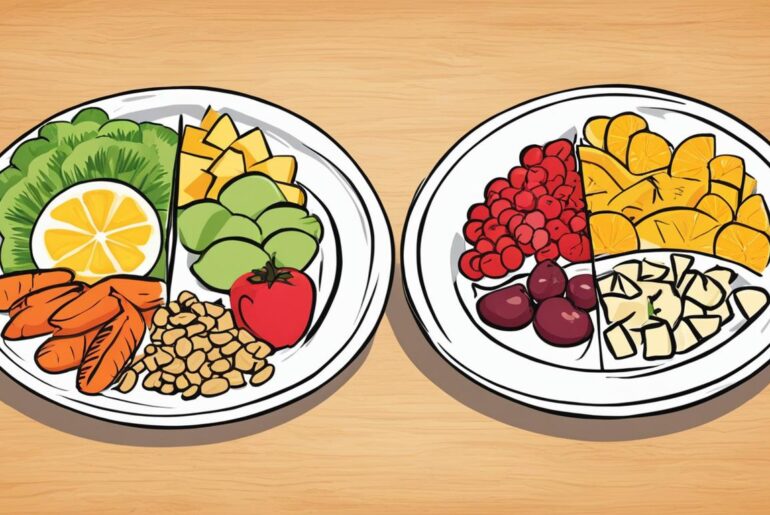Cravings can be the biggest obstacles when it comes to maintaining a healthy diet and achieving our wellness goals. Those intense desires for specific foods, especially processed junk foods high in sugar, can sabotage our efforts to lose weight and make it difficult to stay on track. But fear not, there are strategies that can help us take control of our cravings and make healthier food choices. By being mindful of our cravings and their triggers, staying hydrated, increasing our protein intake, practicing mindful eating, planning meals, and avoiding extreme hunger, we can conquer hunger and embrace a healthier lifestyle.
Key Takeaways:
- Being aware of cravings and their triggers can help us take control of our food choices.
- Staying hydrated by drinking water can reduce the intensity of cravings.
- Increasing protein intake can enhance satiety and prevent overeating.
- Mindful eating and meal planning can help us make healthier choices and manage cravings effectively.
- Avoiding extreme hunger by eating regularly and having nutritious snacks on hand can prevent intense cravings.
Understanding Cravings and Their Impact on Weight Management
Food cravings are a common experience among individuals trying to manage their weight or adopt a healthier diet. These cravings are intense desires for specific foods, often processed junk foods high in sugar. Unfortunately, these cravings can pose significant challenges to weight management and overall health goals.
Cravings can contribute to weight gain, as giving in to them often leads to consuming excess calories and indulging in unhealthy choices. Additionally, cravings can trigger food addiction and binge eating episodes, making it difficult to achieve weight management goals.
It is essential to understand the impact of cravings on weight management in order to take control of our eating habits and make healthier choices. By recognizing the factors that contribute to cravings and adopting strategies to curb them, we can navigate our weight loss or maintenance journey more effectively.
One strategy is to identify the triggers of our cravings. Certain situations, emotions, or even specific times of the day can stimulate our desire for unhealthy foods. By pinpointing these triggers, we can develop alternative coping mechanisms or avoid those situations altogether.
Another effective approach is to engage in mindfulness practices. Mindfulness involves being fully present and non-judgmentally aware of our thoughts and sensations. By practicing mindful eating, we can cultivate a greater sense of awareness around our cravings and make conscious choices.
“Awareness is the first step to change.”
Moreover, incorporating more whole and nutrient-dense foods into our diet can help reduce cravings for processed junk foods. Nutrient deficiencies can often drive cravings, so ensuring we consume a balanced diet rich in essential vitamins and minerals is crucial for managing cravings.
By understanding the impact of cravings on weight management and implementing strategies to combat them, we can take charge of our eating habits and make healthier choices that support our weight loss or maintenance goals.
Impact of Cravings on Weight Management
| Effects of Cravings | Strategies for Prevention and Control |
|---|---|
| Weight gain | Identify triggers and develop coping mechanisms |
| Food addiction | Practice mindfulness and cultivate self-awareness |
| Binge eating | Incorporate nutrient-dense foods into the diet |
The Role of Water and Protein in Curbing Cravings

When it comes to curbing cravings, two essential factors to consider are water and protein. These simple yet powerful elements can play a significant role in reducing the intensity of cravings and helping individuals make healthier choices.
Water:
“Water is the driving force of all nature.” – Leonardo da Vinci
Often, we mistake thirst for hunger or food cravings. By staying properly hydrated through regular water intake, we can effectively curb cravings. Drinking an adequate amount of water can help reduce the intensity of cravings and keep us feeling satisfied for longer periods.
Protein:
“Protein is a macronutrient responsible for numerous vital functions in the body.” – John Hopkins Medicine
Consuming enough protein is crucial for curbing cravings and promoting satiety. Protein-rich foods and beverages help increase feelings of fullness, reduce appetite, and prevent overeating. By including adequate protein in our diet, we can effectively curb cravings and maintain a balanced eating pattern.
The Benefits of Water and Protein in Curbing Cravings
When combined, water and protein offer a powerful duo for curbing cravings:
| Water | Protein |
|---|---|
| Helps reduce the intensity of cravings | Increases feelings of fullness |
| Keeps individuals properly hydrated | Reduces appetite |
| Assists in weight management | Prevents overeating |
By incorporating water and protein into our daily routine, we can address cravings from different angles. Water keeps us hydrated and helps prevent our body from confusing thirst with hunger, while protein helps promote feelings of fullness and satisfaction, reducing the likelihood of succumbing to cravings.
So, the next time you feel a craving coming on, reach for a glass of water and include protein-rich foods in your meals and snacks (see my post here). These simple yet effective strategies can go a long way in curbing cravings and supporting your journey towards a healthier lifestyle.
The Importance of Mindful Eating and Meal Planning
Mindful eating and meal planning are essential practices when it comes to curbing cravings and making healthy food choices. By incorporating these strategies into your daily routine, you can gain control over your eating habits and achieve a balanced and mindful approach to nutrition.
Mindful Eating: Listening to Your Body's Cues
One of the key aspects of mindful eating is paying attention to the present moment and savoring each bite. By slowing down and truly enjoying your food, you can better listen to your body's hunger and fullness cues. This helps you distinguish between cravings and genuine physical hunger, enabling you to choose your response to food.
“The first step to mindful eating is to become aware of your thoughts, emotions, and physical sensations related to food.”
Meal Planning: A Structured Approach to Healthy Eating
Meal planning is another powerful tool in curbing cravings. By planning your meals in advance, you reduce spontaneity and uncertainty, which can often lead to unhealthy food choices. With a structured meal plan, you have the opportunity to incorporate a variety of nutritious foods and ensure that you're meeting your dietary needs.
Here's an example of a simple meal plan for a day:
| Meal | Menu |
|---|---|
| Breakfast | Spinach and mushroom omelet with whole wheat toast |
| Lunch | Grilled chicken breast with quinoa and roasted vegetables |
| Snack | Apple slices with almond butter |
| Dinner | Salmon fillet with brown rice and steamed broccoli |
Note: This is just a sample meal plan and can be adjusted according to your preferences and dietary needs.
By having a meal plan in place, you are less likely to experience intense cravings or resort to unhealthy food options out of convenience.
Incorporating mindful eating and meal planning into your lifestyle can have a profound impact on your overall well-being. By being mindful of your eating habits and having a structured approach to your meals, you can make informed choices that align with your health goals and reduce the occurrence of cravings.
Strategies to Prevent Cravings and Control Hunger

When it comes to maintaining a healthy lifestyle, preventing cravings and controlling hunger are crucial. By implementing these strategies, individuals can take proactive measures to curb their cravings and stay on track with their health goals. Here are some effective strategies to prevent cravings and control hunger:
- Drink Water: Start by staying hydrated throughout the day. Drinking water before meals can help reduce appetite and prevent overeating. Aim for at least eight glasses of water per day.
- Consume Adequate Protein: Include protein-rich foods such as lean meats, fish, eggs, legumes, and nuts in your meals. Protein increases satiety and keeps you feeling fuller for longer, reducing the chances of succumbing to cravings.
- Engage in Physical Activity: When cravings strike, distract yourself by engaging in physical activity. Whether it's going for a walk, doing yoga, or hitting the gym, moving your body can distance you from cravings and redirect your focus.
- Chew Gum: Chewing sugar-free gum can help satisfy the oral fixation associated with cravings without consuming unnecessary calories. It can also help reduce snack cravings between meals.
- Plan Meals in Advance: Planning your meals in advance allows you to make healthier choices and avoid spontaneous cravings. Create a weekly meal plan, including nutritious and satisfying meals that align with your dietary goals.
- Avoid Extreme Hunger: Eat regular meals and have healthy snacks available to avoid extreme hunger. When you let yourself get too hungry, you're more likely to give in to unhealthy cravings. Keep nutritious snacks like cut-up vegetables, fruits, or low-fat yogurt within reach.
- Manage Stress: Stress can trigger cravings for comfort foods. Find healthy ways to manage stress, such as practicing yoga, meditation, deep breathing exercises, or engaging in hobbies you enjoy.
- Incorporate Natural Appetite Suppressants: Consider incorporating natural appetite suppressants like spinach extract into your diet. These supplements can help reduce cravings and control hunger. As always, consult with a healthcare professional before introducing any new supplements to your routine.
By following these strategies, you can prevent cravings and control your hunger, enabling you to make healthier food choices and achieve your wellness goals.
Remember, understanding and managing cravings is an ongoing process. Developing these strategies into lifelong habits will help you conquer hunger and embrace a healthier lifestyle.
The Role of Sleep and Proper Nutrition in Curbing Cravings

Adequate sleep and proper nutrition are crucial factors in curbing cravings and maintaining a healthy lifestyle. Lack of sleep can disrupt the balance of appetite-regulating hormones, leading to increased cravings and poor appetite control. Prioritizing sufficient sleep allows individuals to regulate these hormones and reduce their susceptibility to cravings.
Furthermore, consuming proper meals that provide essential nutrients plays a vital role in curbing cravings caused by nutrient deficiencies. When the body lacks essential vitamins and minerals, it tends to crave unhealthy foods in an attempt to make up for the deficiency. By ensuring a well-rounded diet that includes a variety of nutrient-rich foods, individuals can curb these cravings and support their overall health.
Proper nutrition should include a balanced combination of lean proteins, whole grains, fruits, vegetables, and healthy fats. These nutrient-dense foods nourish the body and help regulate blood sugar levels, which can also contribute to cravings. By maintaining stable blood sugar levels through proper nutrition, individuals can prevent sudden spikes and drops that trigger cravings for sugary or unhealthy foods.
It's important to note that sleep and proper nutrition work hand in hand. When sleep-deprived, individuals are more likely to make unhealthy food choices due to increased cravings and reduced willpower. On the other hand, a lack of proper nutrition can disrupt sleep patterns and affect the quality of sleep obtained.
To achieve optimal sleep and proper nutrition, consider incorporating the following tips:
- Establish a consistent sleep schedule, aiming for 7-9 hours of quality sleep each night.
- Create a relaxing bedtime routine to signal to the body that it's time to sleep.
- Avoid consuming caffeine, nicotine, and alcohol close to bedtime as they can disrupt sleep patterns.
- Avoid heavy meals or large amounts of fluid intake close to bedtime to prevent discomfort and disrupted sleep.
- Include a variety of nutrient-dense foods in your diet, focusing on lean proteins, whole grains, fruits, vegetables, and healthy fats.
- Avoid skipping meals or following restrictive diets that can lead to nutrient deficiencies and increased cravings.
- Stay hydrated by drinking water throughout the day to promote overall health and reduce the intensity of cravings.
By prioritizing adequate sleep and consuming a well-balanced, nutrient-rich diet, individuals can effectively curb cravings and maintain a healthy lifestyle. Proper sleep and nutrition not only support physical well-being but also positively impact overall energy levels, mood, and cognitive function.
Conclusion
Implementing healthy lifestyle habits is essential for curbing cravings and achieving a balanced, nutritious diet. By being aware of our cravings and the triggers that set them off, we can better understand our relationship with food and make conscious choices that support our overall well-being.
Drinking water is a simple yet effective strategy for curbing cravings. Staying hydrated not only helps us distinguish between thirst and hunger, but it also promotes a feeling of fullness, reducing the intensity of our cravings. Additionally, incorporating an adequate amount of protein into our meals and snacks can increase satiety, prevent overeating, and curb those persistent cravings.
Practicing mindful eating and planning our meals in advance are powerful tools for taking control of our cravings. Embracing a mindful eating approach allows us to savor each bite, listen to our body's hunger and fullness cues, and make conscious decisions about the foods we choose to nourish ourselves with. By planning our meals, we can eliminate spontaneity and uncertainty, reducing the likelihood of succumbing to unhealthy cravings.
Avoiding extreme hunger and managing stress are equally important in our quest to curb cravings. By eating regularly and having healthy snacks readily available, we can prevent those intense hunger pangs that often lead to unhealthy food choices. Likewise, managing stress levels through relaxation techniques and self-care practices can help mitigate stress-induced cravings.
Lastly, prioritizing sleep and adopting proper nutrition practices are pivotal in curbing cravings and maintaining a healthy lifestyle. Sufficient sleep ensures hormonal balance and reduces our susceptibility to cravings. Consuming a well-rounded diet that provides essential nutrients and avoids nutrient deficiencies can also help curb cravings caused by imbalances in our bodies.
By adopting these strategies and cultivating healthy habits, we can conquer hunger, achieve our weight management goals, and embrace a healthier lifestyle. Remember, consistency is key, so let's stay committed to making mindful choices, fueling our bodies with nutritious foods, and curbing cravings to support our overall well-being.




